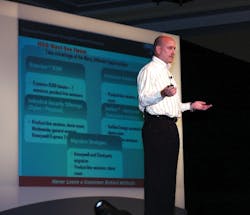30th Event for Honeywell Users
According to Jack Bolick, president, Honeywell Process Solutions (www.honeywell.com/ps), in Phoenix, the User Group is a showcase for the company’s three-pronged solution set of “fully integrated products; tools for implementation, maintenance and migration; and domain expertise.”
The company takes great pride in a history of system introductions designed to protect users’ automation investments with phased migrations and backward-compatible technology. The Experion Process Knowledge System (PKS), introduced in 2002, is the newest distributed control system (DCS) in the Honeywell portfolio, which includes the proprietary legacy systems TDC 2000 and TDC 3000, and the Windows-based TotalPlant Solution (TPS) DCS.
However, noted Peter Zornio, director of product marketing, “Just new DCS technology is not enough.” Experion represents the blending of four areas of competence—“improved process performance, increased asset effectiveness, enhanced business agility and improved people effectiveness,” said Zornio. This combination has contributed to a 16 percent increase in orders and an 8 percent increase in sales for Honeywell, which is twice the industry’s growth rate, according to Bolick.
“It costs the petrochemical industry, for example, $20 billion a year in [incidents due to] avoidable personnel actions,” said Bolick. “We need to understand that’s what keeps our customers up at night.” While the refining and petrochemicals industries have traditionally been strong markets for Honeywell, Bolick cited biopharmaceutical and power generation in emerging regions as growth verticals for the company.
In the past year, Honeywell has made several strategic acquisitions to spur growth, including The Tata Group’s stake in Tata Honeywell, in India, Hysys simulation software from AspenTech, in Cambridge, Mass., and Petrocon, a Russian advanced control solutions developer. On June 15, the company announced the signing of a definitive agreement to acquire InterCorr International Inc., in Houston, a leader in solving corrosion and materials problems. InterCorr’s proprietary SmartCET technology will be integrated with Honeywell’s Experion PKS to provide online, real-time data that will help customers reduce maintenance costs and increase unit productivity through minimizing failures, avoiding unplanned downtime and increased runtime, according to the company. “Global process control industries spend an average of $50 billion a year on corrosion problems, which can hinder their abilities to operate at optimal levels,” said Bolick. “It has been estimated that the cost of corrosion can be reduced by up to 20 percent by going from offline monitoring to InterCorr’s online, real-time technology.”
Small packages
If it’s true that good things come in small packages, then a highlight of the user event was the debut of Honeywell’s new Experion R300 family of C Series controllers and input/output modules (Automation World, May, p.15). Designed as replacements for the Process Manager I/O and C200 controllers—platforms jointly developed by Honeywell and Milwaukee-based Rockwell Automation—the new C300 controllers and Series C I/O offer more power and functionality in 5 percent to 75 percent less space than earlier vintage modules. The C300 controllers use the same software environment as the C200, and both families can run together. A long-term agreement between Honeywell and Rockwell guarantees future support for the C200.
According to Zornio, several key features make the new family unique. The most visual change is the vertical mounting of the modules at an 18-degree slant, which promotes passive thermal cooling and allows for easier terminations without tight bends. The R300 uses fault-tolerant Ethernet (FTE) for Level 1 control, with a firewall that acts as a switch to tie controllers together and protects against anything other than a control message. This is important, said Zornio, because although the system does not use Microsoft Windows at this level, the firewall protects against viruses designed to flood Ethernet networks.
Jane Gerold

